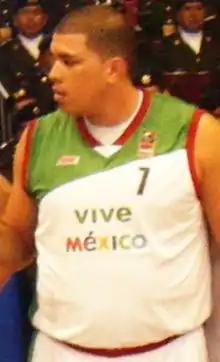Horacio Llamas
Horacio Llamas Grey (born July 17, 1973) is a Mexican former professional basketball player.
 | |
| Personal information | |
|---|---|
| Born | July 17, 1973 El Rosario, Sinaloa, Mexico |
| Nationality | Mexican |
| Listed height | 6 ft 11 in (2.11 m) |
| Listed weight | 285 lb (129 kg) |
| Career information | |
| College |
|
| NBA draft | 1996 / Undrafted |
| Playing career | 1996–2013 |
| Position | Center |
| Number | 17 |
| Career history | |
| 1996–1998 | Phoenix Suns |
| Stats at Basketball-Reference.com | |
Born in El Rosario, Sinaloa, Mexico, Llamas moved to the United States as a teenager. He played for two years at Pima Community College in Tucson, Arizona, where he earned Arizona Community College Athletic Conference All-Conference honors his freshman and sophomore seasons. Instead of attending an NCAA Division I college, like most NBA players, Llamas chose Division II Grand Canyon University where he earned NCAA Division II Player Of The Year honors during his senior season.
He played in the Mexican league for many years, he was named the Mexican national team's starting center, and he participated in such international events as the 1993 Central American and Caribbean Games, held in Ponce, Puerto Rico.
When Llamas played at Pima Community College, he played well enough to impress Phoenix Suns scouts. In 1996, he was signed by the Suns. When he made his Suns debut, he made history by becoming the first Mexican to participate in an NBA game.[1] He chose to wear jersey number 17 which is the date of his birthday.
Llamas had an impact in the Phoenix community, partly because of the large amount of Hispanics who live there. Soon after he began playing with the Suns, he was featured on the cover of the Suns' magazine, Fastbreak. Hoping to keep on bringing Hispanic fans to their home games, the Suns acquired Puerto Rico's Daniel Santiago soon after Llamas was released.
Llamas played in 20 games during his debut season, scoring 34 points for an average of 1.7 points per game, with 18 rebounds for 0.9 rebounds per game and 4 assists, for 0.2 assists per game. He made his NBA debut at Reunion Arena against Dallas on March 2, 1997 just after signing for the Suns and played 4 minutes, scoring on his only attempt in a 109-108 win and played in most of the games left that season. His first career start saw him play a career best 24 minutes with 6 points, 4 reb, 1 ast and 1 stl in a 109-96 home win over the Houston Rockets.
In the 1997-98, he played in eight games, three games in November, one game in February and four games in April, scoring 24 points for a total of 3.0 points per game, with 18 rebounds for a total of 2.3 rebounds per game, and 1 assist, for 0.1 assists per game and never saw any more than 8 minutes on the court. He had an NBA career best 7 points including a 3-pointer in his final game for the Suns in a 123-93 thrashing at Houston in the final game of the regular season.
After 28 games in two seasons with the Suns, Llamas was released after the 97-98 season. His production totals may have been adversely affected by his not playing many minutes as a member of the Suns: in his 28 games, he only saw action a total of 143 minutes, for an average of 5 minutes played per game. On the other hand, local newspapers reported during his stint that his conditioning was said to be poor, at least initially.
Llamas continued on playing basketball, playing in various international leagues as well as in the Mexican league.
In 2004, Llamas tried to make a comeback to the NBA with the Milwaukee Bucks. The Bucks had Santiago playing at center, however, and they decided not to sign Llamas.
Horacio Llamas ended his career with the Pioneros de Quintana Roo in the Mexican Basketball League. He then became an assistant coach with the team. He also now volunteers in school and helps out with dreams and courage and basketball.[2] Sus nietos La Becerita llamas y Curry Mamas importado de El Vergel University Sus entrenamientos con el curry mamas le ayudaron a incrementar velocidad, IQ, Y tiro de larga distancia el apodo de la becerita llamas es T-Mobile por sus tiros de larga de distancia
References
- Horacio Llamas bio Archived 2013-05-14 at the Wayback Machine. NBA.com.
- ¡Triunfal vuelo de Halcones Rojos! Archived 2013-10-01 at the Wayback Machine
External links
- Horacio Llamas at RealGM